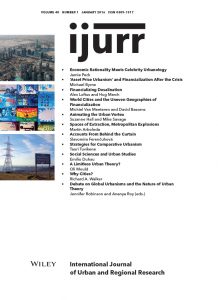The aim of this article is to critically assess the study of post-socialist cities with respect to comparative urbanism. Even though comparative urbanism has challenged the division of the world into largely incommensurable regional containers, where some regions are sources of theory while others remain in the periphery of thinking, post-socialist cities have remained doubly excluded: neither centre nor periphery, neither mainstream nor part of the critique. This article introduces three ways in which post-socialism has and could be perceived: as a container, as a condition and as a de-territorialized concept. It is argued here that seeing post-socialism as a de-territorialized concept that would apply to particular aspects of cities and societies rather than territorialized units in general would allow cities regularly seen as post-socialist to be incorporated into global urban theorizing, while distinctive local histories and experiences still remain analytically present. The article cautions researchers against area-based imaginations of urban theorization, instead arguing in favour of an approach that sees cities first and foremost as ordinary while some aspects could be claimed to be post-socialist. Tallinn is used here as a site from which to draw examples for this mainly literature-based conceptual analysis.

